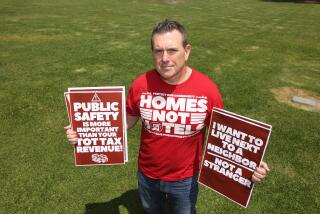Barred From the Website Forum: But Can the Association Do That?
- Share via
Bo Kelleher admits that on some subjects, he minces no words. Same-sex marriage is “garbage,” he says. Abortion-rights activists are “morally bereft,” and child molesters are “subhuman.”
But when he expressed similar opinions on LaderaLife.com, his community’s private website, he was told to play nice or be banned.
He was banned.
“They want to run it like it is a kindergarten,” said Kelleher, 32, a website designer who lives with his wife and young son in Ladera Ranch, a subdivision in south Orange County. “We are all adults here.... I wasn’t very nice in my postings -- that’s what I might be guilty of.”
Kelleher’s story illustrates the challenges that homeowners associations face in governing residents on issues ranging from regulating lawn ornaments to matters of open records and free speech.
Across the country, residents are challenging their associations, arguing they should act more like governments and respect constitutional rights such as freedom of speech.
“These are quasi-public entities, and they must respect the state Constitution,” said Frank Askin, the national counsel for the American Civil Liberties Union who is representing a group of New Jersey residents against their homeowners association over similar issues.
In California, such arguments have led to laws that force homeowners associations to act more like governments. Residents now can scrutinize association finances and fly flags or political banners in front of their homes -- actions once prohibited in many private communities. .
Community managers say restrictive covenants help ensure quality of life and protect property values. In Ladera Ranch and other communities, the rules also apply to the websites.
The Ladera Ranch website was designed to foster a sense of community, and for the most part, LaderaLife.com is used by its 7,300 registered members to exchange things such as wine suggestions, recipes and pet-grooming tips.
Some residents also exchange ideas. Anything and everything is discussed -- as long as the discussion remains civil, said Paul Johnson, a vice president at Rancho Mission Viejo, Ladera’s developer. Kelleher was far from civil, Johnson said.
Kelleher said he was unfairly targeted.
“I think it is OK to disagree in public, and they obviously don’t,” he said.
The disagreement began last fall. Kelleher said he spotted a posting announcing that a Unitarian Universalist Church pastor who had just returned from a “marriage equality caravan” in support of same-sex marriage was going to speak at a local event.
Kelleher, who refers to himself as a “Bible-believing Christian,” took issue with the posting and fired back, he said. “How does this garbage creep onto out [sic] message boards?!,” he wrote. He said he suggested the posting about the pastor’s visit be purged. Instead, Kelleher’s message was yanked.
Weeks later, another resident posted a message urging people to vote for President Bush in the November election. Another resident took issue with Bush’s position on abortion, and the discussion quickly devolved into a graphic argument.
The dispute culminated in December when Kelleher posted the address of a convicted child molester in the neighborhood after getting the information from the state’s Megan’s Law website. That posting also got pulled because he violated LaderaLife rules that prohibit posting a resident’s personal information.
In revolt, Kelleher created his own website. As a parting shot, he e-mailed LaderaLife members listing his grievances and inviting people to visit his site.
For that, he was banned from LaderaLife for six months.
As private communities with resident websites become more prevalent, observers say, flare-ups will become more common. The forums, like town hall gatherings, inevitably invite people to sound off, they say.
Most homeowners associations avoid the problem by simply not offering message boards.
Evan McKenzie, a professor of political science at the University of Illinois in Chicago, said courts would eventually be forced to consider how much homeowners associations are like governments.
In free-speech issues, the courts so far have ruled that individuals shouldn’t have any expectation of free speech when they join voluntary organizations.
More to Read
Sign up for Essential California
The most important California stories and recommendations in your inbox every morning.
You may occasionally receive promotional content from the Los Angeles Times.













